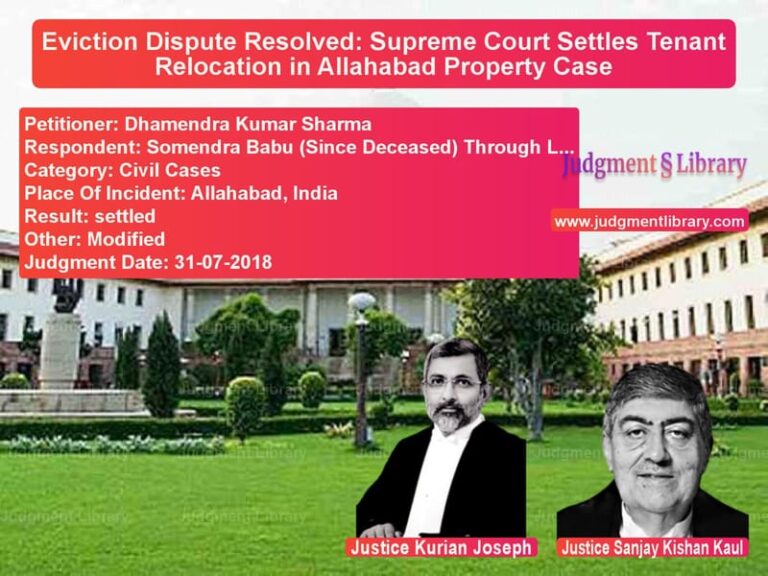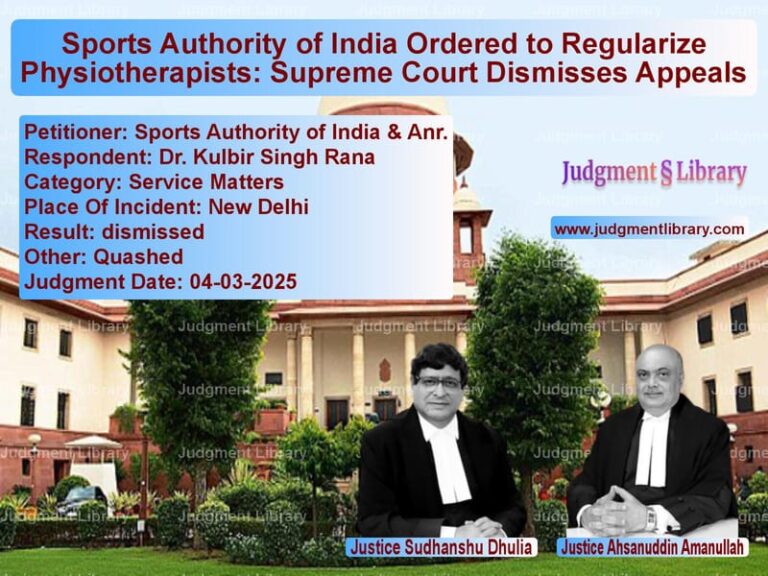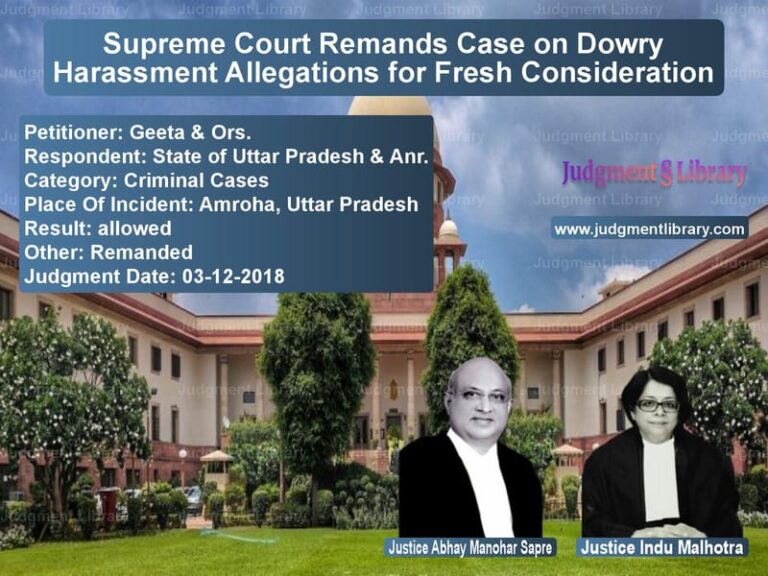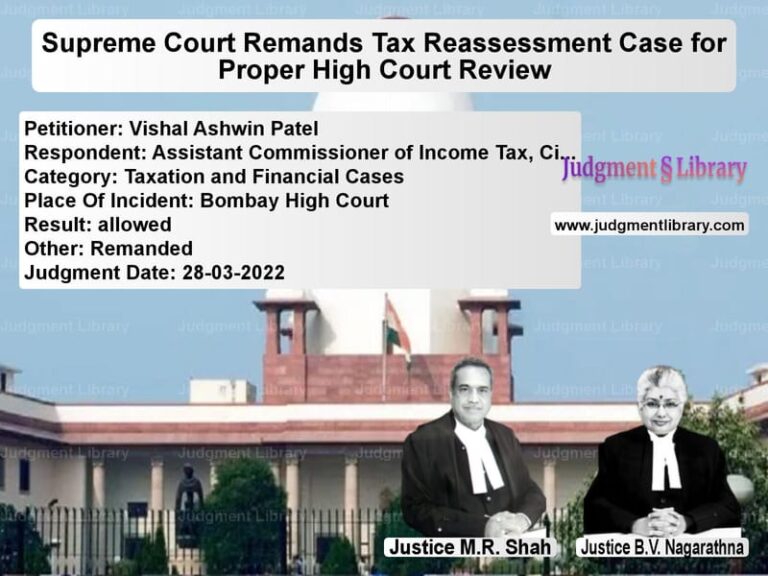Supreme Court Quashes Cheque Bounce Conviction Due to Prior Civil Court Ruling
The case of Prem Raj vs. Poonamma Menon & Anr. highlights the intersection of civil and criminal proceedings in cheque bounce cases under the Negotiable Instruments Act, 1881. The Supreme Court had to decide whether a criminal conviction under Section 138 of the N.I. Act could stand when a civil court had already ruled that the cheque in question was issued as a security instrument rather than for debt repayment.
The Court ruled in favor of the appellant, setting aside his conviction on the ground that a prior civil decree had already declared the cheque as a security instrument, making criminal liability unsustainable.
Background of the Case
The appellant, Prem Raj, had borrowed Rs. 2,00,000 from the complainant, K.P.B Menon, with the promise of repayment on demand. When the complainant demanded payment, the appellant issued a cheque dated June 30, 2002, drawn on South Indian Bank, with the complainant attempting to encash it through Canara Bank, Irinjalakuda Branch. However, the cheque was dishonored with the remarks “insufficient funds” and “payment stopped by drawer.”
Read also: https://judgmentlibrary.com/murder-case-acquittal-reversed-ballu-and-halki-bahus-appeal-revisited/
The complainant issued a demand notice on December 22, 2002, and upon non-payment, filed a criminal complaint under Section 138 of the N.I. Act.
Simultaneously, the appellant had already filed Original Suit No. 1338 of 2002 before the Additional District Munsif, Irinjalakuda, seeking:
- A declaration that the cheque was issued as a security instrument.
- An injunction restraining the complainant from encashing the cheque.
The civil suit was decreed in favor of the appellant on April 11, 2003, affirming that the cheque was indeed issued as a security instrument.
Despite this, the criminal case proceeded, and the Trial Court convicted the appellant, sentencing him to one year of simple imprisonment and imposing a fine of Rs. 2,00,000. The First Appellate Court and later the Kerala High Court upheld this conviction, leading to the present appeal before the Supreme Court.
Key Legal Issues
- Whether a conviction under Section 138 of the N.I. Act can stand when a civil court has already ruled that the cheque was issued as security.
- Whether a criminal court is bound by the findings of a civil court.
- Whether a cheque issued as a security instrument falls under the definition of a legally enforceable debt under the N.I. Act.
Arguments by the Appellant
The appellant contended:
“The civil court has already declared that the cheque was issued as security. A criminal conviction based on the same cheque violates established legal principles.”
He further argued that once a civil court has ruled on the nature of the cheque, a criminal court cannot hold the accused liable under Section 138 of the N.I. Act.
Arguments by the Respondents
The complainant countered:
“A criminal case under the N.I. Act is independent of civil proceedings. The accused issued the cheque, and its dishonor constitutes an offense.”
The complainant further submitted that the lower courts had correctly assessed the evidence and found the appellant guilty.
Supreme Court’s Analysis
1. Binding Nature of Civil Court Decisions on Criminal Courts
The Supreme Court reaffirmed the principle established in Karam Chand Ganga Prasad vs. Union of India (1970) that:
“Decisions of civil courts are binding on criminal courts, but the converse is not true.”
The Court emphasized that since the civil court had already ruled in favor of the appellant, the criminal proceedings should not have continued.
2. Nature of the Cheque and Enforceability Under Section 138
The Court examined whether a cheque issued as security constitutes a legally enforceable debt. Citing Vishnu Dutt Sharma vs. Daya Sapra (2009), the Court ruled:
“A security cheque does not fulfill the requirement of a legally enforceable debt under Section 138.”
Since the cheque in question was issued as security, the dishonor did not trigger criminal liability.
3. Conflict Between Civil and Criminal Proceedings
The Court addressed the potential for conflict between civil and criminal proceedings, referring to Iqbal Singh Marwah vs. Meenakshi Marwah (2005), which held:
“The findings of a civil court do not automatically render criminal proceedings void, but where a civil court has conclusively decided an issue, criminal courts should not contradict it.”
Applying this principle, the Court ruled that the criminal conviction could not stand.
Final Judgment
The Supreme Court set aside the convictions imposed by the lower courts, ruling:
“The criminal proceedings resulting from the dishonor of the cheque, which has been declared a security instrument by a civil court, are unsustainable in law.”
The Court directed that the fine amount imposed on the appellant be refunded immediately.
Key Takeaways from the Judgment
- A cheque issued as security does not attract liability under Section 138 of the N.I. Act.
- A civil court’s ruling on the nature of a cheque is binding on criminal courts.
- Once a civil court has declared a cheque to be a security instrument, criminal proceedings based on the same cheque must be quashed.
- Criminal courts cannot override the findings of a civil court regarding a transaction’s nature.
- This ruling reinforces the principle that a legally enforceable debt or liability is a prerequisite for a conviction under the N.I. Act.
Judgment Date: April 2, 2024
Judges: Sanjay Karol, Aravind Kumar
Petitioner Name: Prem Raj.Respondent Name: Poonamma Menon & Anr..Judgment By: Justice Sanjay Karol, Justice Aravind Kumar.Place Of Incident: Thrissur, Kerala.Judgment Date: 02-04-2024.
Don’t miss out on the full details! Download the complete judgment in PDF format below and gain valuable insights instantly!
Download Judgment: prem-raj-vs-poonamma-menon-&-anr-supreme-court-of-india-judgment-dated-02-04-2024.pdf
Directly Download Judgment: Directly download this Judgment
See all petitions in Fraud and Forgery
See all petitions in Cheque Dishonour Cases
See all petitions in Judgment by Sanjay Karol
See all petitions in Judgment by Aravind Kumar
See all petitions in allowed
See all petitions in Quashed
See all petitions in supreme court of India judgments April 2024
See all petitions in 2024 judgments
See all posts in Criminal Cases Category
See all allowed petitions in Criminal Cases Category
See all Dismissed petitions in Criminal Cases Category
See all partially allowed petitions in Criminal Cases Category







